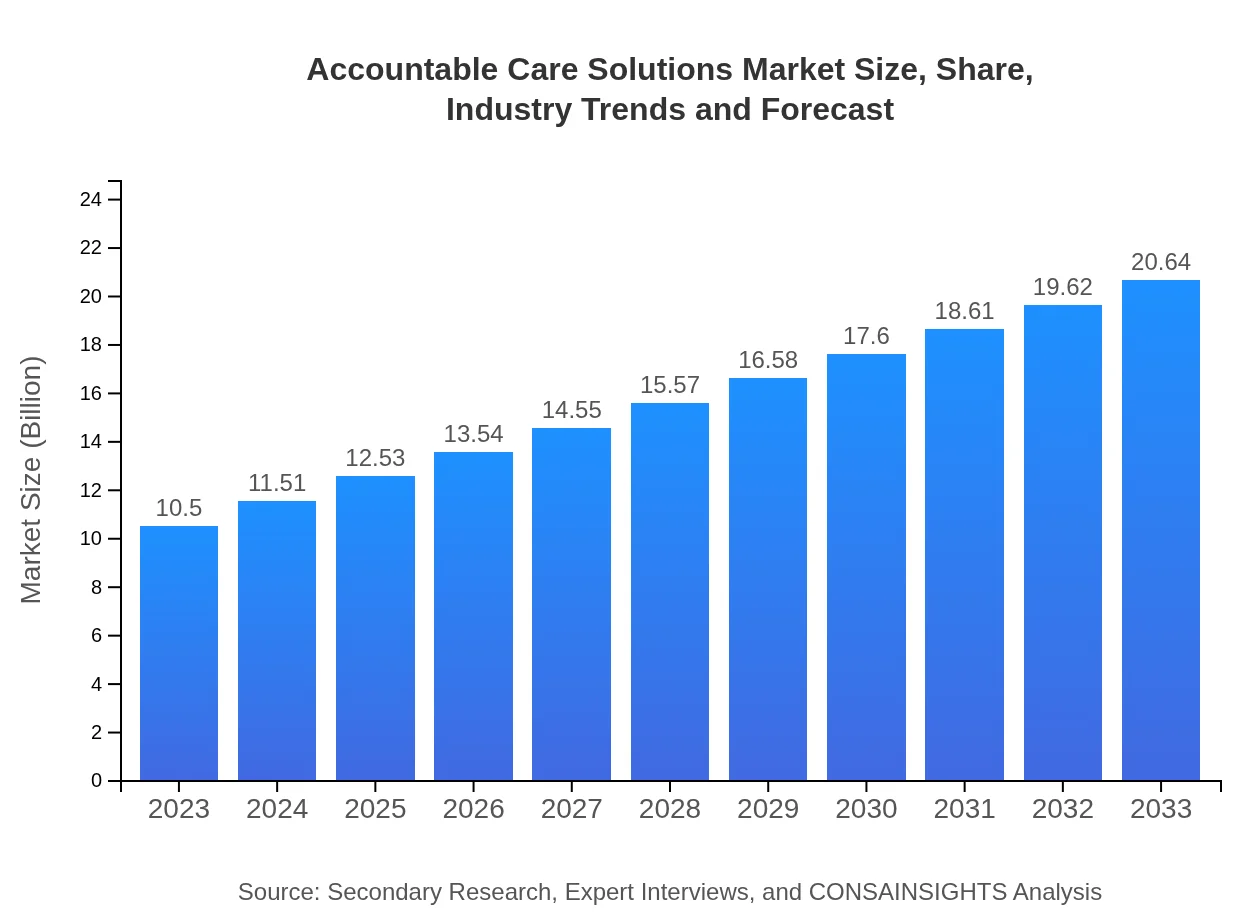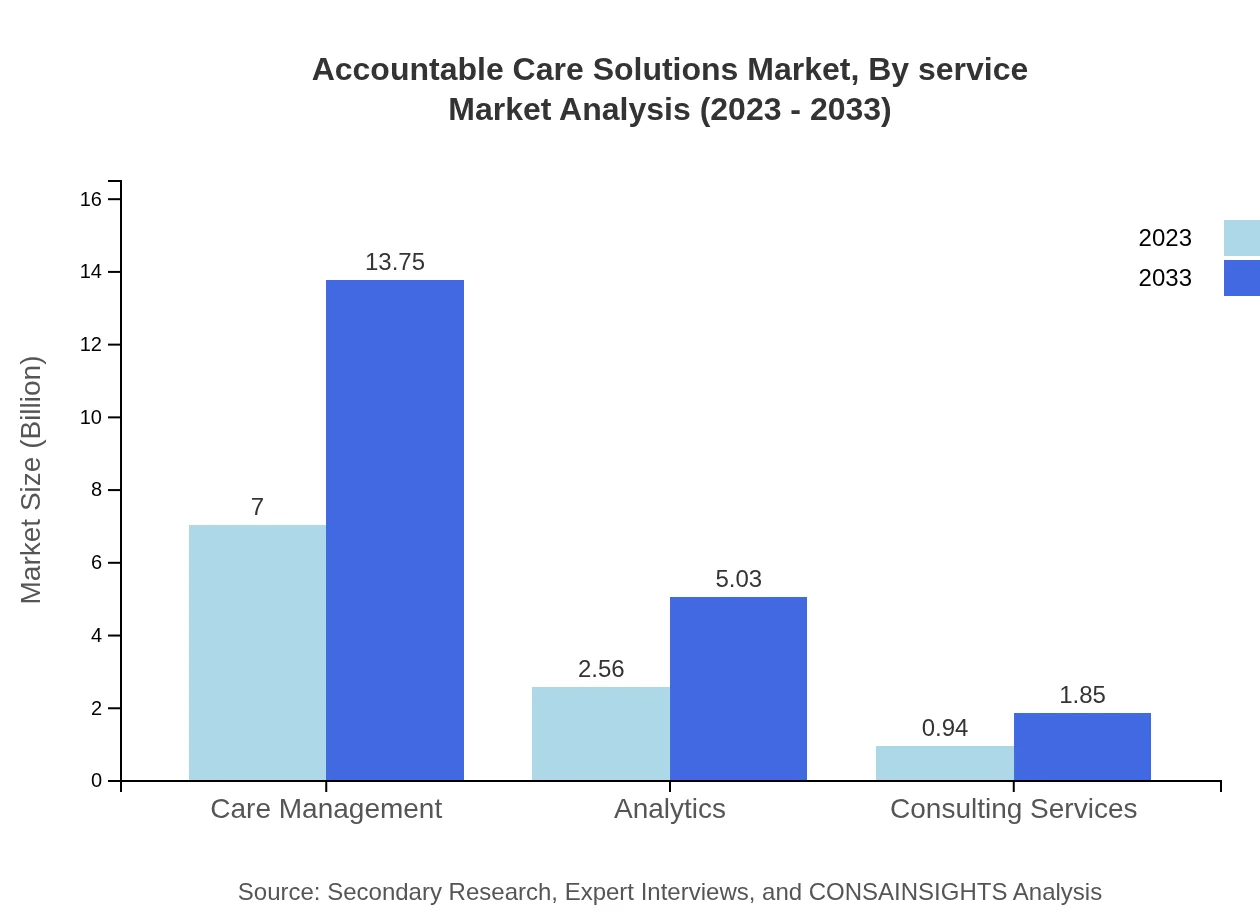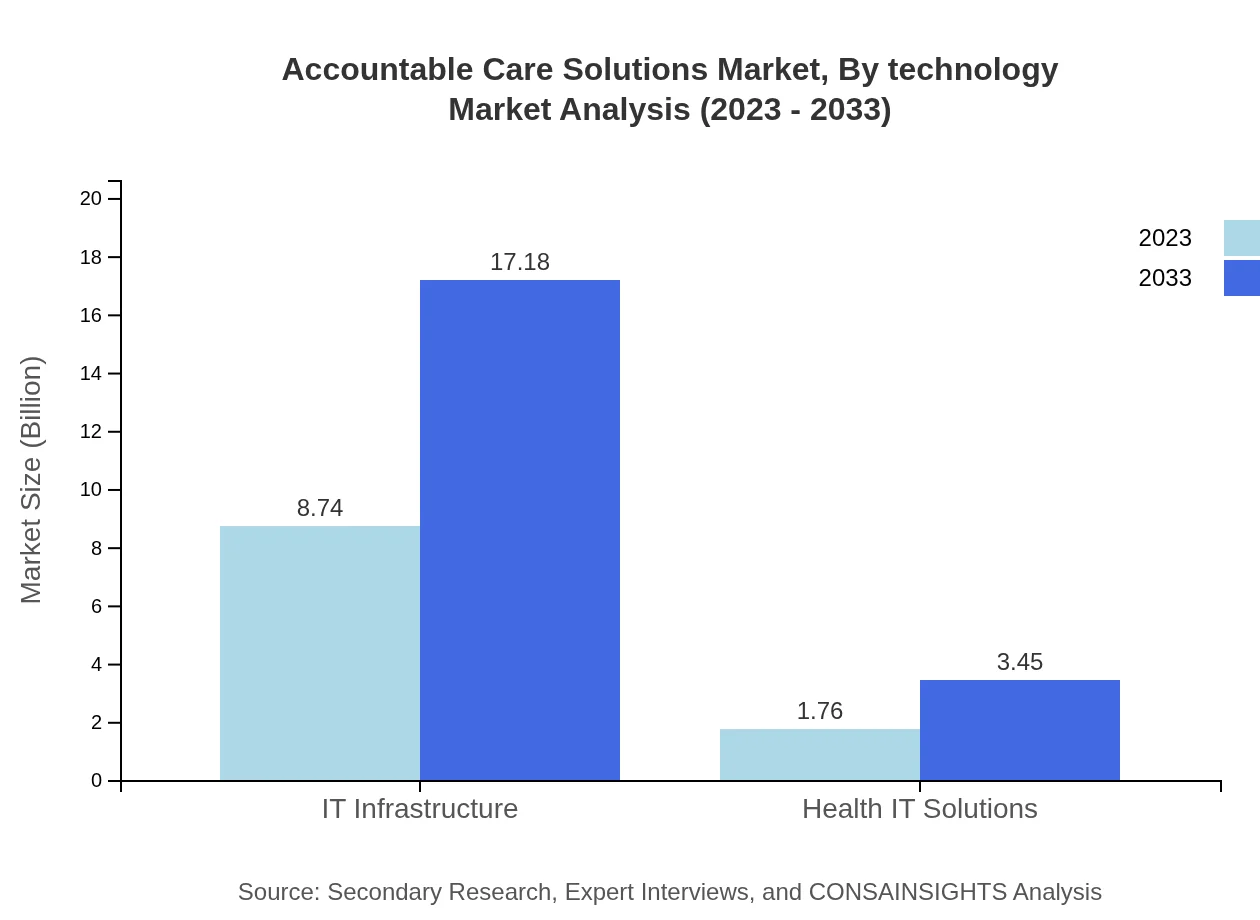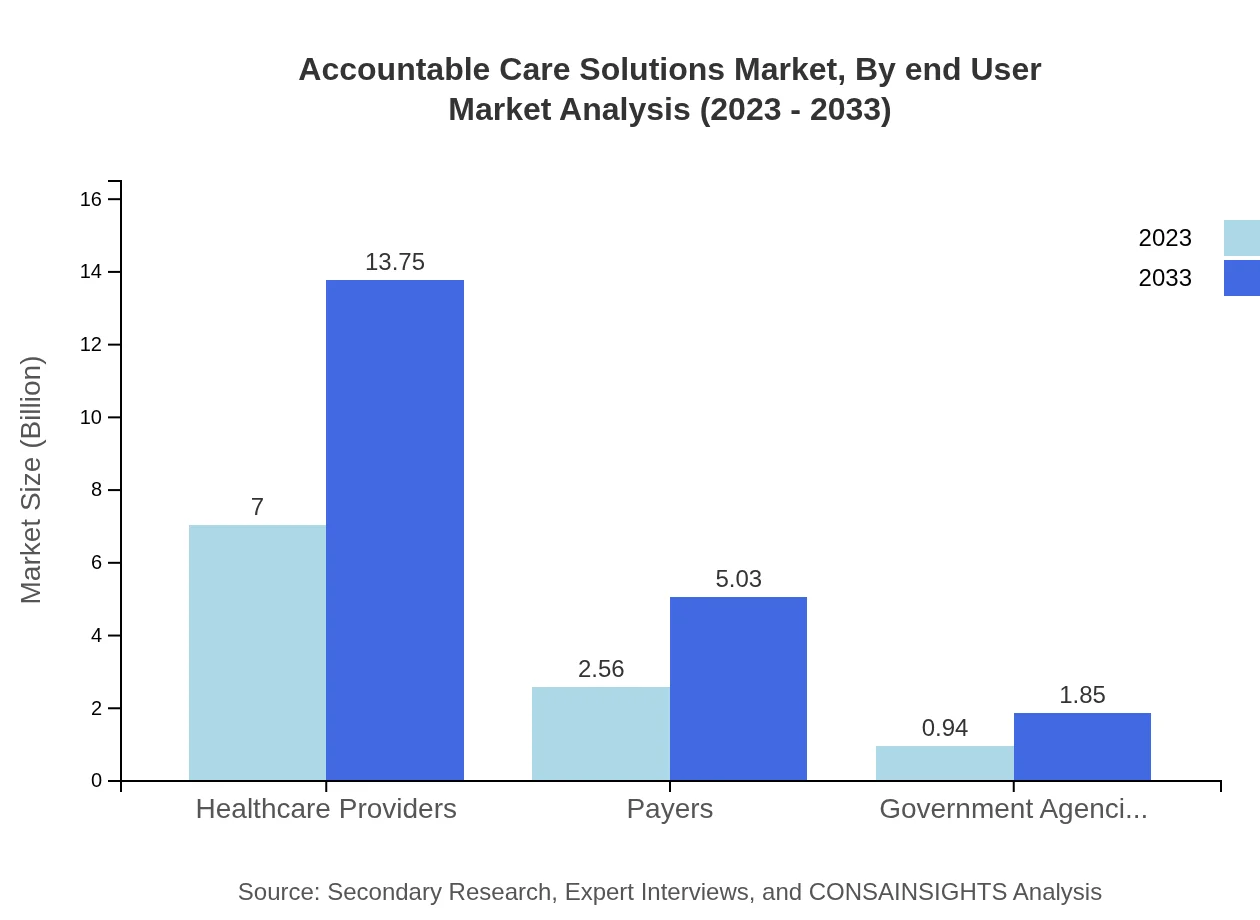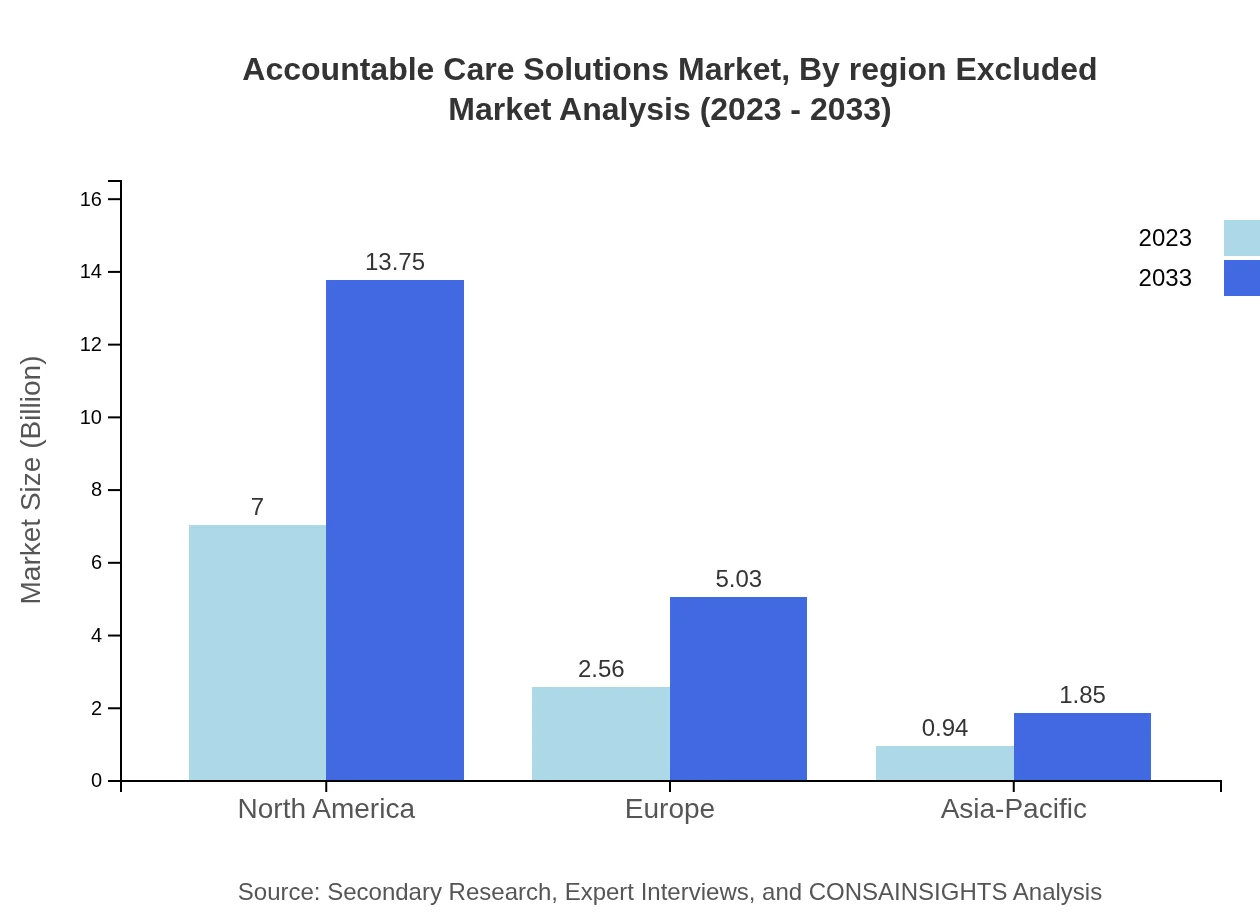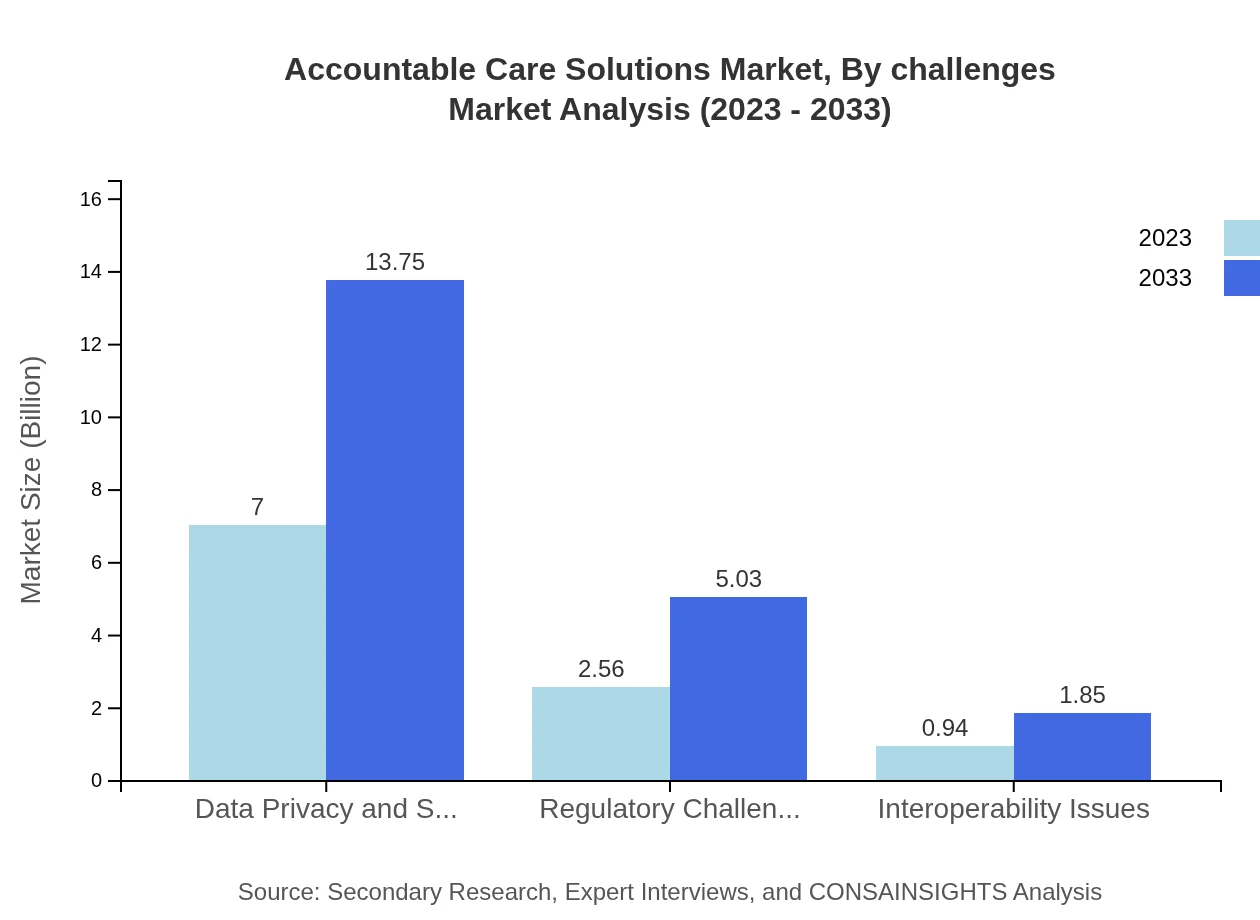Accountable Care Solutions Market Report
Published Date: 31 January 2026 | Report Code: accountable-care-solutions
Accountable Care Solutions Market Size, Share, Industry Trends and Forecast to 2033
This report provides an in-depth analysis of the Accountable Care Solutions market, including market size, segmented analysis, regional Insights, and future trends forecasts from 2023 to 2033.
| Metric | Value |
|---|---|
| Study Period | 2023 - 2033 |
| 2023 Market Size | $10.50 Billion |
| CAGR (2023-2033) | 6.8% |
| 2033 Market Size | $20.64 Billion |
| Top Companies | Optum, Cerner Corporation, McKesson Corporation, Allscripts Healthcare Solutions, Philips Healthcare |
| Last Modified Date | 31 January 2026 |
Accountable Care Solutions Market Overview
Customize Accountable Care Solutions Market Report market research report
- ✔ Get in-depth analysis of Accountable Care Solutions market size, growth, and forecasts.
- ✔ Understand Accountable Care Solutions's regional dynamics and industry-specific trends.
- ✔ Identify potential applications, end-user demand, and growth segments in Accountable Care Solutions
What is the Market Size & CAGR of Accountable Care Solutions market in 2023?
Accountable Care Solutions Industry Analysis
Accountable Care Solutions Market Segmentation and Scope
Tell us your focus area and get a customized research report.
Accountable Care Solutions Market Analysis Report by Region
Europe Accountable Care Solutions Market Report:
The European Accountable Care Solutions market is projected to grow from $3.53 billion in 2023 to approximately $6.93 billion by 2033. Factors contributing to this growth include rising chronic disease prevalence and the implementation of Integrated Care Systems across the region.Asia Pacific Accountable Care Solutions Market Report:
In the Asia Pacific region, the Accountable Care Solutions market is projected to grow from $1.99 billion in 2023 to approximately $3.91 billion by 2033, representing a strong annual growth rate driven by increasing healthcare expenditure and the adoption of advanced IT solutions in countries like China and India.North America Accountable Care Solutions Market Report:
In North America, the market size is anticipated to increase from $3.48 billion in 2023 to $6.83 billion in 2033, demonstrating a robust demand for comprehensive care solutions fueled by regulatory reforms and a shift to value-based care frameworks.South America Accountable Care Solutions Market Report:
The South American market for Accountable Care Solutions is expected to expand from $0.98 billion in 2023 to around $1.92 billion by 2033. This growth is supported by government initiatives to improve healthcare systems and the rising demand for quality healthcare services.Middle East & Africa Accountable Care Solutions Market Report:
The Middle East and Africa region is expected to see growth from $0.53 billion in 2023 to about $1.04 billion by 2033. Growth drivers include investments in healthcare systems and emerging health technology trends aimed at improving healthcare quality and accessibility.Tell us your focus area and get a customized research report.
Accountable Care Solutions Market Analysis By Service
In 2023, the Care Management segment holds the largest market share at approximately 66.65% and is anticipated to grow from $7.00 billion to $13.75 billion by 2033. Analytics, which accounts for about 24.39% of the market share, is expected to expand from $2.56 billion to $5.03 billion. Consulting Services comprise 8.96% of the market, projected to grow from $0.94 billion to $1.85 billion by 2033.
Accountable Care Solutions Market Analysis By Technology
Technological advancements such as Health IT Solutions and IT infrastructure are at the forefront of the Accountable Care Solutions revolution. Health IT Solutions are projected to increase from $1.76 billion to $3.45 billion by 2033. IT infrastructure, responsible for 83.27% of the market share, is anticipated to grow from $8.74 billion to $17.18 billion, highlighting the importance of robust technology in this sector.
Accountable Care Solutions Market Analysis By End User
The end-user segmentation indicates that healthcare providers dominate the market with a 66.65% share, with a substantial increase from $7.00 billion to $13.75 billion over the forecast period. Payers account for 24.39%, and government agencies comprise 8.96% of the market share.
Accountable Care Solutions Market Analysis By Region Excluded
The overall market dynamics indicate a thriving demand across all segments, with North America leading due to investment in technology and regulatory support. Europe follows closely, with an emphasis on integrated care models. Asia-Pacific is emerging as a high-growth region driven by urbanization and healthcare reforms.
Accountable Care Solutions Market Analysis By Challenges
Key challenges impacting the market include regulatory hurdles affecting technology adoption, interoperability issues between systems, and data privacy and security concerns. These factors could inhibit rapid market growth if not adequately addressed by stakeholders.
Accountable Care Solutions Market Trends and Future Forecast
Tell us your focus area and get a customized research report.
Global Market Leaders and Top Companies in Accountable Care Solutions Industry
Optum:
A leader in health services and innovation, Optum provides comprehensive solutions tailored for accountable care organizations, focusing on quality and efficient care delivery.Cerner Corporation:
Cerner offers a wide range of health information technology solutions that support accountable care initiatives, enabling better patient outcomes through actionable insights.McKesson Corporation:
As a pharmaceutical distribution leader, McKesson also provides technology solutions that enhance care coordination and optimize operations across healthcare systems.Allscripts Healthcare Solutions:
Allscripts focuses on providing EHR and care management platforms that facilitate accountable care practices and improve health outcomes.Philips Healthcare:
Philips delivers advanced healthcare solutions to streamline accountable care processes, leveraging technology to enhance patient experiences and outcomes.We're grateful to work with incredible clients.









FAQs
What is the market size of accountable Care Solutions?
The global market size for Accountable Care Solutions is projected to reach approximately $10.5 billion by 2033, growing at a CAGR of 6.8% from its current value in 2023. This growth reflects increasing demand for value-based care models.
What are the key market players or companies in this accountable Care Solutions industry?
Key players in the Accountable Care Solutions market include major healthcare IT firms and consulting companies specializing in integrated care management systems, analytics, and patient engagement strategies, shaping the future of healthcare delivery.
What are the primary factors driving the growth in the accountable Care Solutions industry?
Factors driving growth include the shift towards value-based care, increased emphasis on cost control, adoption of advanced analytics, and improvements in patient engagement and care coordination technologies.
Which region is the fastest Growing in the accountable Care Solutions?
Europe and North America are the fastest-growing regions, with the European market expected to grow from $3.53 billion in 2023 to $6.93 billion by 2033, presenting significant opportunities for industry advancements.
Does ConsaInsights provide customized market report data for the accountable Care Solutions industry?
Yes, ConsaInsights offers customized market report data tailored to specific needs within the accountable care solutions sector, ensuring comprehensive insights that align with client requirements.
What deliverables can I expect from this accountable Care Solutions market research project?
Deliverables typically include detailed market analysis reports, growth forecasts, competitive landscape assessments, insights into customer trends, and recommendations tailored to specific business strategies.
What are the market trends of accountable Care Solutions?
Current market trends in Accountable Care Solutions include increased use of AI and data analytics, a focus on interoperability between systems, and growing emphasis on patient-centered care models, shaping the landscape for stakeholders.

